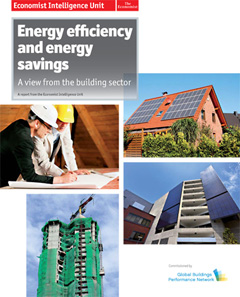9 November 2012
Businesses are Ready to "Go Deep," says an Economist Intelligence Unit in a Report
According to 75% of real estate and construction executives surveyed in the European Union, India, China and the United States, energy efficiency legislation benefits the building sector. More than a third of survey respondents (34%) to an Economist Intelligence Unit’s survey commissioned by the Global Buildings Performance Network (GBPN), say a lack of enforcement of existing regulations is a leading obstacle to investments in efficiency. This positive view of legislation presents significant opportunities for decision makers in all regions to develop policy tools that can increase building energy efficiency and performance.
"Given the fact that buildings account for about a third of total energy use worldwide and of energy related CO2 emissions, the research suggests that business leaders are ready to go deep and are waiting for the right policy signals that can scale up energy efficiency in the sector," says Peter Graham, GBPN Executive Director.
Key Findings
The report, titled Energy Efficiency and Energy Savings: A View from the Building Sector (PDF), explores how real estate and construction executives approach energy efficiency regulation in their business. Key findings include:
- The survey shows a large consensus among executives worldwide on the issue of climate change. In Europe, China, and India, 84% of respondents consider cutting carbon missions associated with their business to be their responsibilities. In the United States, however, no more than 60% of respondents are of that opinion.
- Many companies are ill informed about energy realities and the true cost of energy consumption. One third of the respondents underestimate the financial significance of energy consumption in their own business. Many are also unclear about the cost of constructing energy efficient buildings. While the actual additional cost varies between 5% and 15%, two thirds of respondents overestimate the cost, saying that energy efficient buildings cost 15% more than a standard construction.
- Evidence in the report that the message that energy efficiency is good for business is gaining momentum across the building sector. Sixty-three percent of respondents say that energy efficiency influences their investment decisions; and this is true across all regions. Half of respondents are taking a longer-term view of investments. More than 50% of respondents are ready to tolerate payback terms of five years or longer.
- Companies are already taking action and going beyond equipment upgrades. More than half of respondents (57%) are adding building insulation, almost the same proportion is adopting more efficient heating, ventilation, and air conditioning (HVAC) systems and replacing inefficient lighting.
- Businesses welcome carrots and sticks. They see legislation as a means of levelling the playing field, thus strengthening the business case for energy investments. Sixty-eight percent of respondents estimate that carbon taxes are helpful to drive investments in efficient buildings. And, the same proportion believes that global agreements limiting carbon emissions would create a level playing field for businesses.
Video Summary
About the Survey
In the summer of 2012, the Economist Intelligence Unit conducted a survey of 423 senior executives from the real estate and construction industries. The survey was global in scope with 27% of respondents based in the United States, 24% in the European Union, 25% in China, and 24% in India. All respondents were drawn from operations, strategy, and finance functions. More than half (51%) were C-level executives or above, and nearly half (49%) came from organisations with more than US$500m in global annual revenue.

